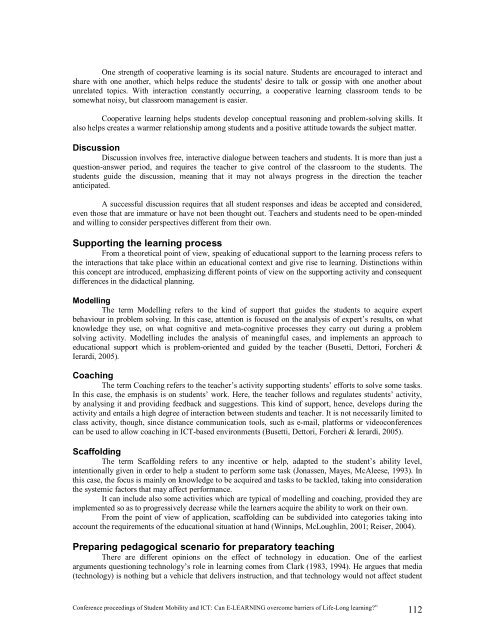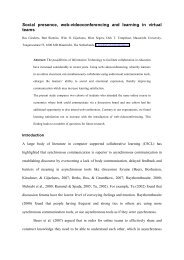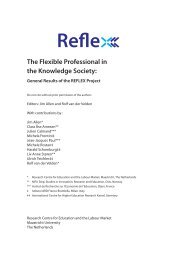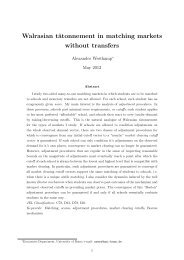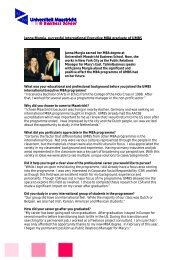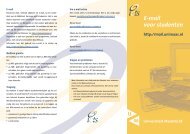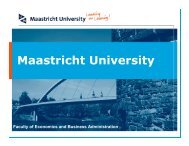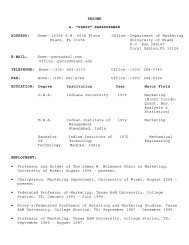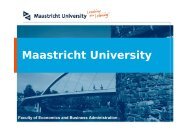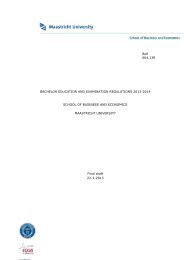proceedings of Student Mobility and ICT: Can E-LEARNING
proceedings of Student Mobility and ICT: Can E-LEARNING
proceedings of Student Mobility and ICT: Can E-LEARNING
You also want an ePaper? Increase the reach of your titles
YUMPU automatically turns print PDFs into web optimized ePapers that Google loves.
One strength <strong>of</strong> cooperative learning is its social nature. <strong>Student</strong>s are encouraged to interact <strong>and</strong><br />
share with one another, which helps reduce the students' desire to talk or gossip with one another about<br />
unrelated topics. With interaction constantly occurring, a cooperative learning classroom tends to be<br />
somewhat noisy, but classroom management is easier.<br />
Cooperative learning helps students develop conceptual reasoning <strong>and</strong> problem-solving skills. It<br />
also helps creates a warmer relationship among students <strong>and</strong> a positive attitude towards the subject matter.<br />
Discussion<br />
Discussion involves free, interactive dialogue between teachers <strong>and</strong> students. It is more than just a<br />
question-answer period, <strong>and</strong> requires the teacher to give control <strong>of</strong> the classroom to the students. The<br />
students guide the discussion, meaning that it may not always progress in the direction the teacher<br />
anticipated.<br />
A successful discussion requires that all student responses <strong>and</strong> ideas be accepted <strong>and</strong> considered,<br />
even those that are immature or have not been thought out. Teachers <strong>and</strong> students need to be open-minded<br />
<strong>and</strong> willing to consider perspectives different from their own.<br />
Supporting the learning process<br />
From a theoretical point <strong>of</strong> view, speaking <strong>of</strong> educational support to the learning process refers to<br />
the interactions that take place within an educational context <strong>and</strong> give rise to learning. Distinctions within<br />
this concept are introduced, emphasizing different points <strong>of</strong> view on the supporting activity <strong>and</strong> consequent<br />
differences in the didactical planning.<br />
Modelling<br />
The term Modelling refers to the kind <strong>of</strong> support that guides the students to acquire expert<br />
behaviour in problem solving. In this case, attention is focused on the analysis <strong>of</strong> expert’s results, on what<br />
knowledge they use, on what cognitive <strong>and</strong> meta-cognitive processes they carry out during a problem<br />
solving activity. Modelling includes the analysis <strong>of</strong> meaningful cases, <strong>and</strong> implements an approach to<br />
educational support which is problem-oriented <strong>and</strong> guided by the teacher (Busetti, Dettori, Forcheri &<br />
Ierardi, 2005).<br />
Coaching<br />
The term Coaching refers to the teacher’s activity supporting students’ efforts to solve some tasks.<br />
In this case, the emphasis is on students’ work. Here, the teacher follows <strong>and</strong> regulates students’ activity,<br />
by analysing it <strong>and</strong> providing feedback <strong>and</strong> suggestions. This kind <strong>of</strong> support, hence, develops during the<br />
activity <strong>and</strong> entails a high degree <strong>of</strong> interaction between students <strong>and</strong> teacher. It is not necessarily limited to<br />
class activity, though, since distance communication tools, such as e-mail, platforms or videoconferences<br />
can be used to allow coaching in <strong>ICT</strong>-based environments (Busetti, Dettori, Forcheri & Ierardi, 2005).<br />
Scaffolding<br />
The term Scaffolding refers to any incentive or help, adapted to the student’s ability level,<br />
intentionally given in order to help a student to perform some task (Jonassen, Mayes, McAleese, 1993). In<br />
this case, the focus is mainly on knowledge to be acquired <strong>and</strong> tasks to be tackled, taking into consideration<br />
the systemic factors that may affect performance.<br />
It can include also some activities which are typical <strong>of</strong> modelling <strong>and</strong> coaching, provided they are<br />
implemented so as to progressively decrease while the learners acquire the ability to work on their own.<br />
From the point <strong>of</strong> view <strong>of</strong> application, scaffolding can be subdivided into categories taking into<br />
account the requirements <strong>of</strong> the educational situation at h<strong>and</strong> (Winnips, McLoughlin, 2001; Reiser, 2004).<br />
Preparing pedagogical scenario for preparatory teaching<br />
There are different opinions on the effect <strong>of</strong> technology in education. One <strong>of</strong> the earliest<br />
arguments questioning technology’s role in learning comes from Clark (1983, 1994). He argues that media<br />
(technology) is nothing but a vehicle that delivers instruction, <strong>and</strong> that technology would not affect student<br />
Conference <strong>proceedings</strong> <strong>of</strong> <strong>Student</strong> <strong>Mobility</strong> <strong>and</strong> <strong>ICT</strong>: <strong>Can</strong> E-<strong>LEARNING</strong> overcome barriers <strong>of</strong> Life-Long learning?” 112


